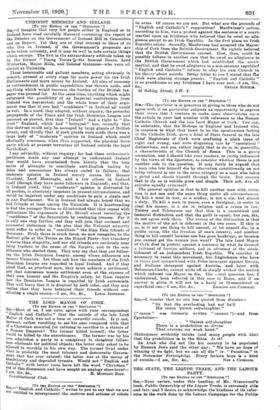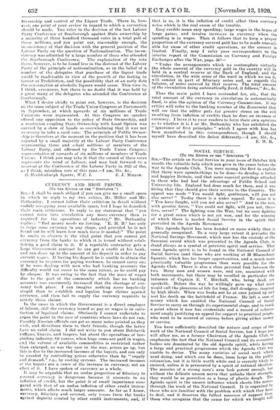THE STATE, THE LIQUOR TRADE, AND THE LABOUR PARTY.
(To THE EDYTO3 Or Tin " SPECTATOR.")
Sea,—Your review, tinder this heading, of Mr. Greenwood's. book, Public Ownership of the Liquor Trade, is extremely able. and fair, and I desire to acknowledge the kindness of its refer- ence to the work done by the Labour Campaign for the Public
Ownership and control of the Liquor Trade. There is, how- ever, one point of your review in regard to which a correction should be made. You refer to the decision of the last Labour Party Conference at Scarborough against State ownership by a majority of three hundred thousand votes in a total poll of three millions, and you point out, reasonably enough, the insonsisteney of that decision with the general position of the Labour Party on the question of Nationalization. The incon- sistency was admitted by a large number of those who attended the Scarborough Conference. The explanation of the vote there, however, is to be found less in the distrust of the Labour Party of the principle of nationalization, as in the belief of a number of the delegates that purchase of the liquor trade would be inadvisable in view of the growth of the feeling in favour of Prohibition, and the possibility that at an early date the censumption of alcoholic liquors would cease. This view is. I think, erroneous, but there is no doubt that it was held by n great many of the delegates who attended the Conference at Scarborough.
What I desire chiefly to point out, however, is the decision on the same subject of the Trade Union Congress at Portsmouth in September, at which upwards of six millions of Trade Unionists were represented. At this Congress no speaker offered any opposition to the policy of State Ownership, and a resolution coupling State Ownership with Local Option was carried by a show of hands so overwhelming that it was not ueeessary to take a card vote. The principle of Public Owner- .hip is therefore at the moment in the position that it has been rejected by a small majority at the Labour Party Conference representing three and a-half millions of members of the Labour Party, and affirmed by the Trade Union Congress representative of upwards of six millions of members of Trade Unions. I think you may take it that the second of there votes represents the mind of Labour, and may look forward to a reversal at the Conference of the Labour Party in 1921 of the, as I think, mistaken vote of this year.—! am, Sir, &c.,
45 31celtlenburgh SQuare, W.C. 1. 5. J. MALLON.







































 Previous page
Previous page